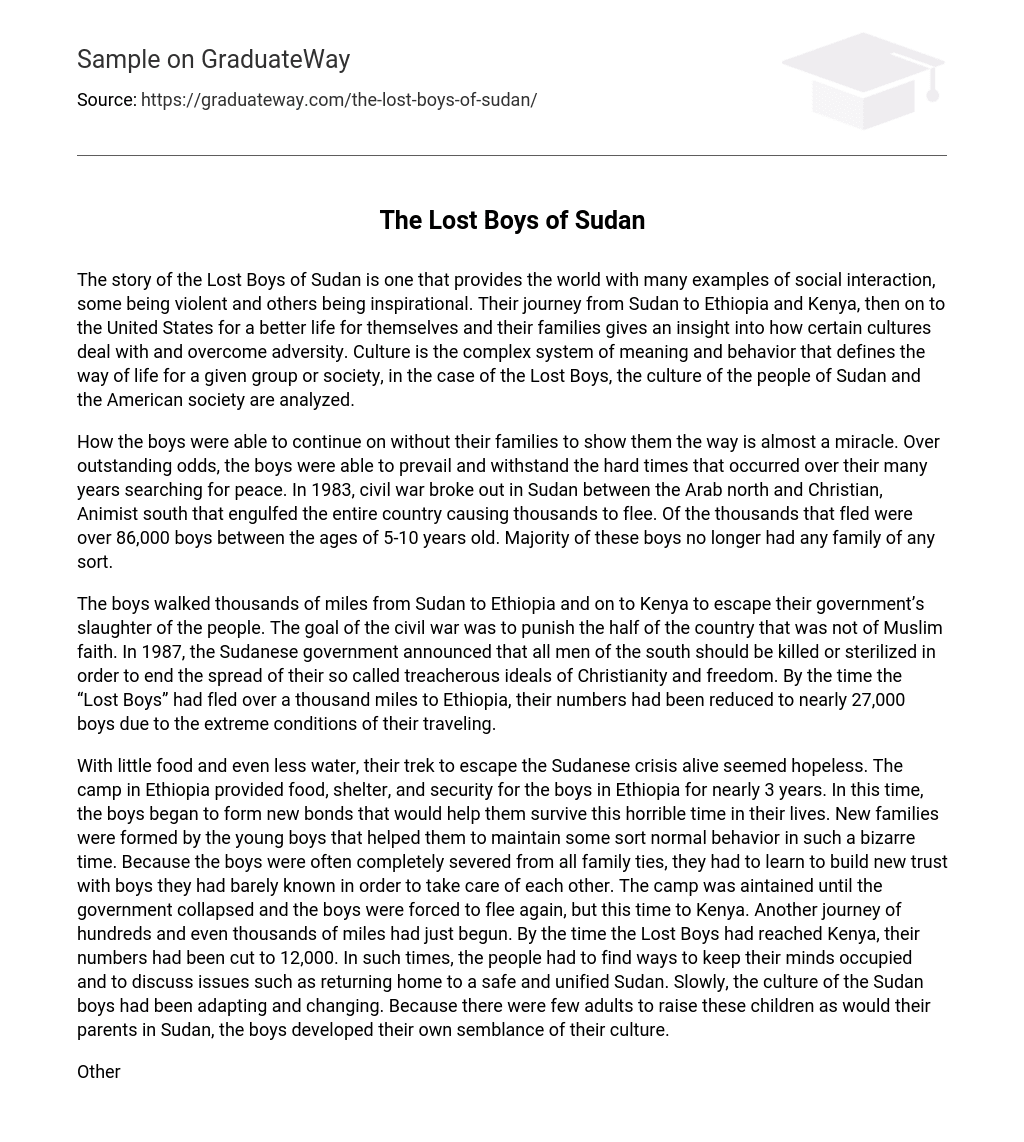The Lost Boys of Sudan have an exemplary narrative that showcases a range of social interactions, both aggressive and uplifting. They offer insights into how diverse cultures confront and conquer challenges as they journey from Sudan to Ethiopia and Kenya, ultimately settling in the United States. The text explores the cultural aspects of Sudanese and American societies, emphasizing the intricate framework of meaning and behavior that defines each group’s way of life.
Although lacking family support, the boys showed remarkable resilience and determination in their quest for peace. Despite facing difficult obstacles, they not only survived but also overcame numerous challenges during their extensive search. In 1983, Sudan was torn apart by a civil war that divided the Arab north from the Christian/Animist south, leading to widespread displacement throughout the country. Among those who fled were over 86,000 boys between the ages of 5 and 10 years old, many of whom had no familial guidance.
The boys embarked on a lengthy journey from Sudan to Ethiopia and later Kenya, seeking refuge from their government’s systematic genocide of non-Muslims. The civil war sought to punish those who did not adhere to the Muslim faith in the country. In 1987, the Sudanese government issued an official statement calling for the elimination or sterilization of all men from the southern region, aiming to eradicate what they viewed as dangerous beliefs in Christianity and freedom. Upon reaching Ethiopia, approximately 27,000 “Lost Boys” endured numerous hardships during their expedition.
Despite the lack of food and water, the boys’ arduous escape from the Sudanese crisis seemed hopeless. The Ethiopian camp offered them sustenance, shelter, and security for almost 3 years. During this time, they formed new bonds to help endure this challenging period, creating makeshift families for a sense of normalcy. Being isolated from their own families meant building trust with unfamiliar boys to care for each other.
However, when the government collapsed, the camp became unsustainable and the boys had to flee once again, this time to Kenya. This marked another journey spanning hundreds or even thousands of miles. Their numbers dwindled to 12,000 upon reaching Kenya. Despite these hardships, they found ways to occupy their minds and discuss topics like returning home safely and reuniting Sudan.
Their cultural identity gradually evolved in Kenya due to a lack of adult guidance that would have been present in Sudan.
It is surprising to think that in some societies, many young boys must navigate their culture without family or other sociological guidance. Numerous cultures do not comprehend the existence of genocide, particularly in Sudan. In Western society, where people tend to be more accepting of diverse cultural beliefs, this form of ethnocentrism raises concerns. However, as they are not directly involved in this particular culture, other regions of the world do not take significant action to end the crisis in Sudan.
Certain western cultures saw this as a chance to impose their society and customs on the African people. The Lost Boys were assembled and those who consented were relocated to America with the aim of starting afresh, potentially improving their previous lives. However, some individuals struggled with the cultural disparities and were unsuccessful in adapting to western culture. On the other hand, for others, the diverse culture and unique opportunities presented in their new home proved to be highly advantageous.
Lost Boys, who had been dispersed across the United States, were granted the chance to pursue happiness for both themselves and, in certain cases, their families whom they had not seen since fleeing Sudan. Numerous of these boys, now matured into men, diligently sought out and obtained employment opportunities, with some even achieving high school and college qualifications while residing in the United States. A considerable portion of the wages earned by the lost boys were dedicated to reuniting with their families or supporting their families directly in Africa. The Lost Boys take great pride in their diligent efforts to improve their own circumstances as well as those of their homeland.
Several groups of boys tried to raise awareness about the situation in Sudan. The government acknowledged the Lost Boys of Sudan as a separate group, which provided them with certain political opportunities. Despite being scattered across the country, the boys managed to unite and address various issues related to improving their situation in America as well as that of their families and homeland in Sudan. Consequently, many Sudanese men started drifting away from their own culture and traditions, instead embracing the western culture of America.
There were some older men who perceived this as the culmination of Sudanese culture and desired it to cease. However, residing in America bestowed upon all Sudanese boys a fresh perspective on culture and life, irrespective of their endeavors to oppose it. While certain individuals encountered challenges adapting to the transformation, others embraced their circumstances and even played a significant role in instigating change during the civil war. The Sudan civil crisis resulted in various occurrences, both favorable and unfavorable. The immense tragedy of numerous casualties, encompassing men, women, and children, due to religious and ethnic conflicts represents an enormous ordeal for any culture to witness.
The Lost Boys’ experience is extraordinary, as they endured suffering and showcased adaptability. Facing the challenge of adapting to a new culture can ultimately lead to an improved life. The lack of adult guidance during childhood may make it hard for others to comprehend how one can develop and embrace a new culture. Yet, the Lost Boys demonstrate that through hardship, they were able to introduce fresh perspectives, concepts, and lifestyles to their families and country.





